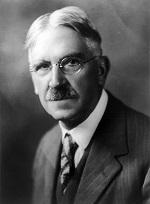Week 1: Is education fit for the future?
Introduction
Welcome to Week 1 of Looking globally: the future of education.
Governments across the world spend vast amounts of money on education every year – often prioritising this over other important areas such as health. Globally, the idea of ‘universal primary education’ – the aim that all children will be given access to a full course of primary schooling – is seen as important enough to have been enshrined in the United Nations’ Millennium Development Goals (United Nations, 2006).
But why is education seen as so important? What vital purpose is education seen to fulfil? The American philosopher and educational reformer John Dewey gave his view of this in 1934:
The purpose of education has always been to everyone, in essence, the same: to give the young the things they need in order to develop in an orderly, sequential way into members of society. This was the purpose of the education given to a little aboriginal in the Australian bush before the coming of the white man. It was the purpose of the education of youth in the golden age of Athens. It is the purpose of education today, whether this education goes on in a one-room school in the mountains of Tennessee or in the most advanced, progressive school in a radical community. But to develop into a member of society in the Australian bush had nothing in common with developing into a member of society in ancient Greece, and still less with what is needed today. Any education is, in its forms and methods, an outgrowth of the needs of the society in which it exists.
Think about:
Although some of the phrases in this quote may seem jarring or out of date, how far do you agree that:
- the purpose of education is to pass on the culture of a society to the young?
- education developed in one era or culture can be exported to another?
Participating in this course
This course has been designed to offer different ways for you to participate and engage with the ideas and information we offer. These include written texts, audio and audio-visual stimuli. There are also some activities which must be completed to gain the badge. These have been selected as key activities in which to participate in order to maximise your learning from this course.
You will also be regularly prompted to ‘Think about’ certain questions and ideas. We would encourage you to note down your ideas in a way that is convenient for you, as you may find it helpful to refer to these when completing subsequent activities.
Full details of the different types of activities you will participate in can be found in Activities and tools [Tip: hold Ctrl and click a link to open it in a new tab. (Hide tip)] .
The Open University would really appreciate a few minutes of your time to tell us about yourself and your expectations for the course before you begin, in our optional start-of-course survey. Participation will be completely confidential and we will not pass on your details to others.


